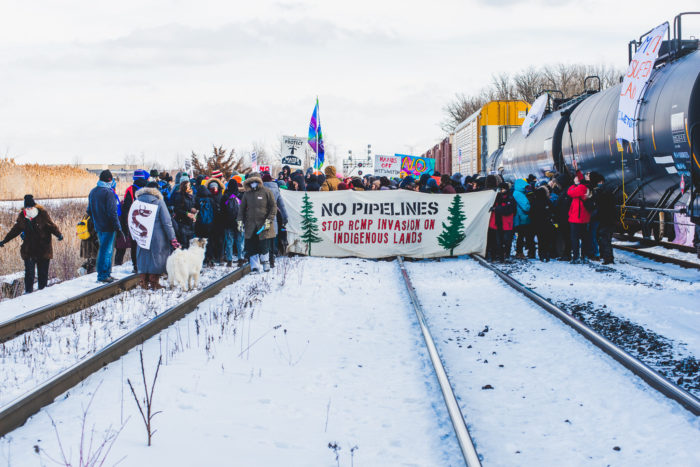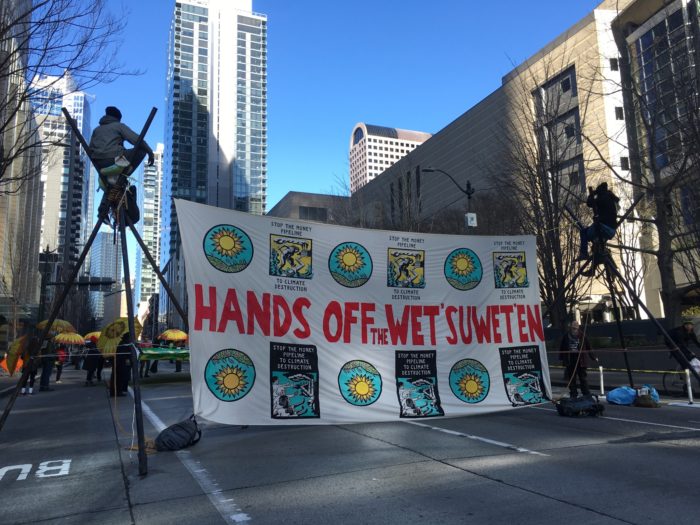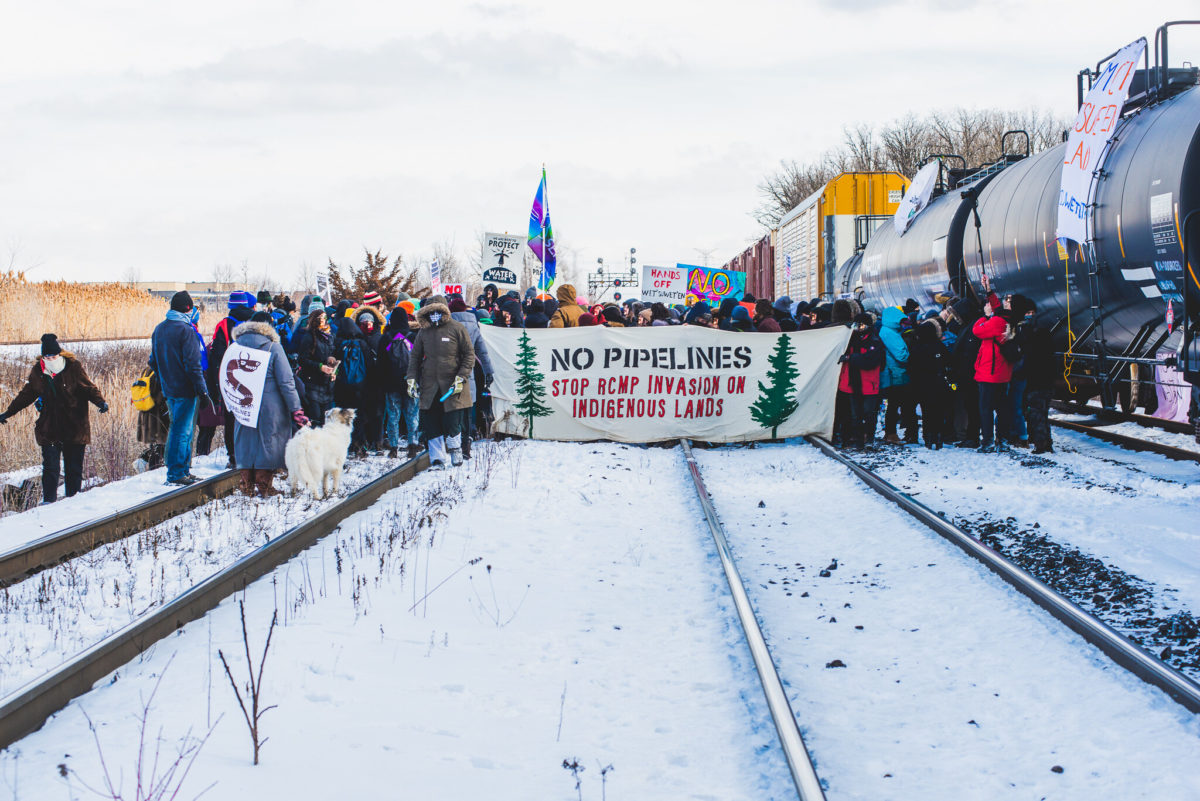The short version
At the end of May 2020, at least 26 banks from around the world took part in a US$4.7 billion project finance loan to fund the construction of the destructive, rights-violating Coastal GasLink pipeline. At the same time, a deal closed between TC Energy and two new investors in the project: KKR and AIMCo. Keep reading for all the details.
Coastal GasLink resistance
This winter, a new wave of protests erupted in solidarity with the Wet’suwet’en struggle against the Coastal GasLink pipeline. Indigenous peoples and allies gathered at government buildings throughout Canada, blockaded the offices of Coastal GasLink and its financial backers around the globe, and shut down ports, railways, streets, and bridges.
This Indigenous-led uprising was prompted on February 6, when the Royal Canadian Mounted Police used assault rifles, snipers, dogs, sound cannons, and helicopters to carry out a five-day militarized police raid and remove peaceful Indigenous land defenders from their homes on unceded Wet’suwet’en territory.
For the past ten years, the Wet’suwet’en have asserted their sovereignty to stop fossil fuel companies from trespassing on their lands. Under ‘Anuc niwh’it’en (Wet’suwet’en law), the five clans of the Wet’suwet’en have not provided the free, prior, and informed consent to Coastal Gaslink and its parent company TC Energy to do work on Wet’suwet’en territory.
And yet, the Canadian government is trying to ram through the 420-mile (670-kilometer) Coastal GasLink pipeline, which would carry fracked gas from northeast British Columbia to a massive proposed liquefied natural gas (LNG) terminal on the coast.
The banks and investors supporting the Coastal GasLink pipeline are contributing to this clear abuse of Indigenous rights, even though many of them have stated policies acknowledging the right to free, prior, and informed consent of Indigenous communities.

Who’s banking the pipeline? February 2020 Update
RAN published the original “Who’s banking the Coastal GasLink pipeline?” blog in January 2019. Here’s where things stand now.
Banks:
On May 25, 2020, TC Energy announced that Coastal GasLink had secured a project finance package that would cover up to 80% of the pipeline’s construction costs. The loan, worth US$4.7 billion, was extended by a group of 26 banks, with Royal Bank of Canada leading the deal.
Other financiers include commercial banks and government-owned banks from Australia, Canada, China, Germany, Japan, Singapore, South Korea, Spain, and the United States.
Here’s the full list of banks backing Coastal GasLink, organized by country:
- Australia: National Australia Bank
- Canada: Royal Bank of Canada, Bank of Montreal, Bank of Nova Scotia, Canadian Imperial Bank of Commerce, Export Development Canada, National Bank of Canada, TD, ATB Financial, Canadian Western Bank
- China: Bank of China, China Construction Bank, Industrial and Commercial Bank of China
- Germany: KfW IPEX-Bank, Landesbank Baden-Wuerttemberg
- Japan*: Mizuho, MUFG, SMBC Group
- Singapore: United Overseas Bank
- South Korea: Kookmin Bank
- Spain: CaixaBank
- US: Bank of America, Citi, JPMorgan Chase, Truist Securities (formerly SunTrust Robinson Humphrey), Raymond James Bank
In the run-up to the deal, more than 200,000 of you signed a petition demanding that JPMorgan Chase (Chase) stay far away from Coastal GasLink and cut ties with TC Energy. Thousands of people contacted Chase executives and took to the streets to shut down its branches from Seattle to Ithaca. And yet, Chase chose to directly finance the destructive pipeline. It’s no surprise, as Chase is the world’s largest banker of fossil fuels in the world, but it does mean that we have to ramp up the pressure to stop business as usual.

Ownership:
Before the banks unlocked their financing, TC Energy had to complete a sale of partial ownership of the pipeline to new global investors.
On May 25, 2020, TC Energy closed a deal selling 65% of the project to investment firm Kohlberg Kravis Roberts & Co (KKR) and Alberta Investment Management Corporation (AIMCo). Big banks HSBC, TD, and Royal Bank of Canada helped make this ownership sale happen.
Despite new owners, TC Energy intends to continue managing all construction and operation contracts, on behalf of this new partnership:
- TC Energy (formerly TransCanada), is a major North American fossil fuel infrastructure company. Coastal GasLink is a project of TransCanada Pipelines Ltd., the same subsidiary of TC Energy behind the controversial Keystone XL tar sands pipeline.
- KKR is a publicly-traded American global investment firm headquartered in NYC, with USD$208 billion in assets under management. This purchase was made in partnership with South Korea’s state-run pension fund,
the National Pension Service of Korea (NPS). - AIMCo manages USD$81.2 billion in assets on behalf of 31 Alberta pension, endowment, and government funds. It is a Crown corporation, which in this case means that it is owned by the government of Alberta.
KKR and AIMCo have come under increasing scrutiny for betting individuals’ retirement savings on such a risky, rights-violating project. From London to Alberta, people are mobilizing and demanding that these new investors drop the pipeline.
What’s next
This fight is not over. Wet’suwet’en resistance to the project remains strong on the frontlines, and the role of the Canadian government, banks, and investors in supporting Coastal GasLink and TC Energy is being exposed.
We demand that the financial institutions named above cut their ties with TC Energy, as the company tramples on Indigenous rights in order to ram through the dangerous pipeline. The world is watching and RAN and allies will continue to pressure these banks and investors to stop supporting Indigenous rights abuses.
How to Support
Donate: We encourage everyone to support the Wet’suwet’en by donating to the
Unist’ot’en Camp and Gidimt’en Yintah Access point.
Take action: Check out the
2020 Wet’suwet’en Strong: Supporter Toolkit.
Add your name: Sign this petition to demand that Chase and KKR immediately cut ties with Coastal GasLink.
Join RAN’s Year of Climate Action: Sign up to join our monthly actions to pressure JPMorgan Chase and other institutions to stop financing fossil fuel projects and human rights abuses.
* Note: An additional Japanese financial institution, Sumitomo Mitsui Trust Holdings, is listed as a lender to this project by the IJGlobal database, but not by Bloomberg Finance L.P. (the source for this blog post).
